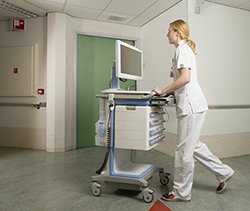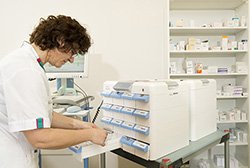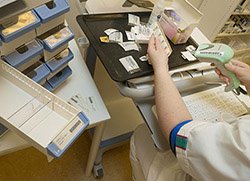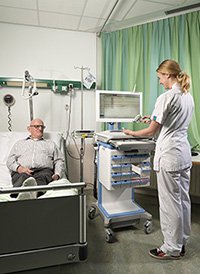Improving Quality of Care
High-quality health care is a priority in Dutch hospitals. Digitization is considered one of the tools for quality improvement, and is especially useful in minimizing medication errors. Forty percent of these errors are related to administration, making this an obvious target for improvement. The Antonius Hospital in Sneek took on the challenge and is now one of the first hospitals in the Netherlands to use fully digitized prescription and administration with barcode verification.
 When you see it in the hallway under the AMiS, it doesn't look all that spectacular – Alphatron’s medication box. But looks are deceiving. This brand-new box represents years of development. The flexible system allows for medication to be taken all the way to the bed. In order to make sure that the correct medication is being given to the correct patient, the patient is first scanned and then each individual medication. The pharmacy, where the medicationboxes are filled, also uses strict dispensing registration. Each tablet, each little aspirin, has a barcode. One person works full-time to label all medication not barcoded in the factory. A robot packages oral medication unsuitable for unit administration in a barcoded bag. Everything is scanned before the boxes are filled. And this is done for over 300 beds with 600-1,000 mutations daily. Quite the job.
When you see it in the hallway under the AMiS, it doesn't look all that spectacular – Alphatron’s medication box. But looks are deceiving. This brand-new box represents years of development. The flexible system allows for medication to be taken all the way to the bed. In order to make sure that the correct medication is being given to the correct patient, the patient is first scanned and then each individual medication. The pharmacy, where the medicationboxes are filled, also uses strict dispensing registration. Each tablet, each little aspirin, has a barcode. One person works full-time to label all medication not barcoded in the factory. A robot packages oral medication unsuitable for unit administration in a barcoded bag. Everything is scanned before the boxes are filled. And this is done for over 300 beds with 600-1,000 mutations daily. Quite the job.
"First the patient's wristband is scanned, then all medications.
The same care is exercised in the pharmacy when filling the medication boxes.
Each tablet is scanned before being placed in the patient's holder."
AMiS Medication Box
 The AMiS Medication Box CL is a medication box with sixteen large compartments. The box comes with a touch display and a PIN code that will simultaneously open or close all medication compartments. This intelligent system features an electronic locking mechanism that restricts medication access to health care professionals only. In order to safely manage dispensing at all times, the system is fitted with a programmable timer that automatically locks the medication boxes after a set time period.
The AMiS Medication Box CL is a medication box with sixteen large compartments. The box comes with a touch display and a PIN code that will simultaneously open or close all medication compartments. This intelligent system features an electronic locking mechanism that restricts medication access to health care professionals only. In order to safely manage dispensing at all times, the system is fitted with a programmable timer that automatically locks the medication boxes after a set time period.
Specifications
The introduction of digital medication records in the Antonius Hospital was part of a larger project that included specialist activity records and nurse activity records. As the medication records team leader, hospital pharmacist Michiel Duyvendak was the driving force for this subproject. "Medication errors are the most common errors in hospitals. Addressing this problem takes very high priority, and digitization helps," he said.
One requirement was a workstation at patients' bedsides. The hospital opted for a Computer on Wheels (COW). A hospital-wide project group went to work to draft the specifications. Ageeth Koffeman, cardiology unit leader said, "User convenience was high on our list, together with hygiene and long-life batteries. But the most important thing was for the medication box to lock automatically without a key."
Removable Box
Three suppliers were invited to submit quotations, but Alphatron was the only one that offered both user convenience with the AMiS, plus a detachable medication cassette that could be removed for convenient replenishment in the pharmacy. There was one minor detail however: the medication box existed on paper only.

This proved to be a problem. Because Alphatron rejected the first prototype, delivery was delayed significantly. "As a result, we used old boxes under the beautiful new AMiS units for months. This was bad for staff morale, and we should have done better in our communication," said Koffeman.
"Each tablet, each little aspirin, has a barcode."
Resistance
At the beginning, there was considerable resistance among the staff. Nurses had to become familiar with the system and doctors needed to change their way of writing prescriptions. Not all barcodes could be scanned at first, and sometimes the COWs had login problems or insufficient range for the wireless network. Said Koffeman, "What helped tremendously was the fact that each department received a pharmacy practitioner—a permanent, specially trained pharmacy assistant who supports specialists and nurses with electronic prescriptions and administration. Additionally, she does patient intake, and checks medications when patients are discharged from the hospital."
Automatic Lock
In December 2012 the new boxes were finally delivered. The AMiS units were converted smoothly to allow for the new boxes. "Now they look great and they work great also," Koffeman stated. What was the greatest benefit of the new system? "That the box locks automatically," Koffeman immediately responded. "We don't have to remember that anymore. And also, knowing for sure you're dealing with the right patient. We actually had to unlearn not to scan the record, but to scan the patient instead. For instance, we now have a married couple with the same last name in the same room. But when you scan, you make no mistakes and the correct administration record opens. Perhaps there will be a photograph as extra support in the future."
"It looks great and it works great also"
Success
Were there any disappointments? Duyvendak said, "We had no way of knowing beforehand that implementing the digital medication record would be so much work. You're a medical professional. You don't want to know about login codes for the wireless network or where you can have a socket or not. It was a hectic but also a fulfilling year."
 Koffeman agreed and added, "So much happened over the past year. We have really boosted our performance. To be a peripheral hospital and one of the first in the Netherlands to achieve this with a relatively small staff says something about the innovative drive of our hospital pharmacy. If the pharmacy had not been so supportive, we would not have been successful."
Koffeman agreed and added, "So much happened over the past year. We have really boosted our performance. To be a peripheral hospital and one of the first in the Netherlands to achieve this with a relatively small staff says something about the innovative drive of our hospital pharmacy. If the pharmacy had not been so supportive, we would not have been successful."
About the Antonius Hospital
The Antonius Hospital in Sneek and Emmeloord provides health care to residents of the Friesland South-West region and the Noordoostpolder region. The hospital is strong in so-called availability functions, such as emergency assistance, intensive care, and obstetrics. But all other specialists have excellent track records in their fields also. In cooperation with Friesland Ambulance Care (Ambulancezorg), the Antonius Hospital operates two ambulance boats that are used during the water sports season. Residents and tourists in the North Friesian Islands count on and receive quick and capable care from the Antonius Hospital. And this care is appreciated. The Antonius Hospital was named most patient-friendly hospital of 2012 in the Netherlands. The Antonius Hospital and Friesland South-West Homecare merged to form the Antonius Healthcare Group in 2007. The Antonius Healthcare Group is one of the first homecare hospitals in the Netherlands. Offering homecare and hospital care from one organization, the group provides clients with a complete health care package that operates seamlessly from homecare to hospital care and back. The Antonius Healthcare Group has over 3500 employees.

